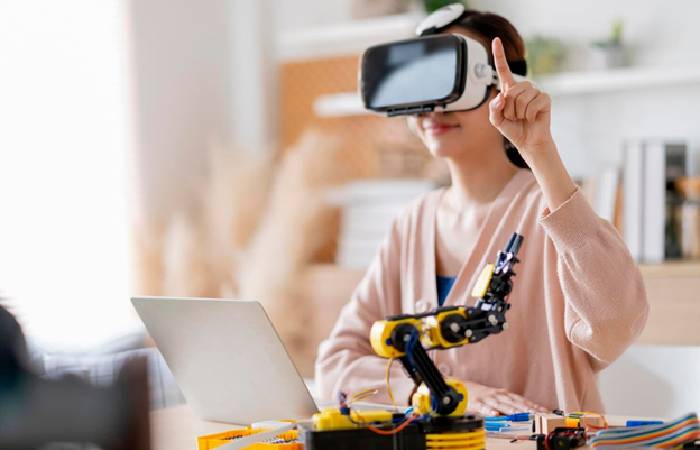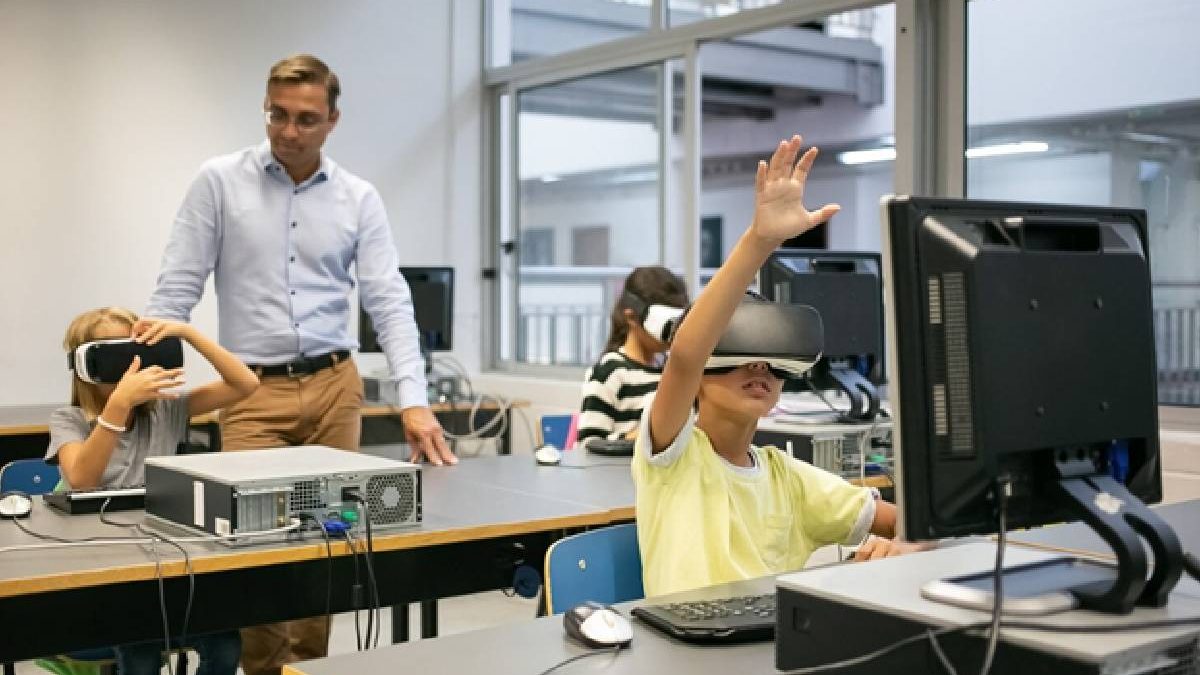What do you imagine when it comes to AI in education? Let’s not waste time. Come to this post for an overview of AI in education.
Artificial intelligence (AI) is transforming numerous sectors of our society considerably, and education is no exception. As we delve into the 21st century, AI technology is emerging as a powerful solution for enhancing the learning experience and making education more personalized and efficient. This article aims to shed light on the common applications of AI in the education sector. It delves into the various ways AI is being harnessed to revolutionize teaching and learning processes, making them more interactive, engaging, and tailored to individual student needs. The potential of AI in the edtech field also entices any AI software development company to join the race and share profits. From AI-powered e-learning platforms to intelligent tutoring systems, the integration of AI in education is opening up a world of possibilities and redefining traditional teaching methodologies. By exploring the ongoing advancements in this field, we will gain a deeper understanding of how this cutting-edge technology is shaping the future of education.
Table of Contents
The Most Common Yet Essential Uses of AI in the Education Sector
(AI) is becoming a significant player in the education sector, enabling a more personalized, interactive, and effective learning experience. Here are some of the main applications of AI in education:
School Management
AI can be used to manage a variety of administrative tasks within a school or educational institution. This includes maintaining student records, managing transportation schedules, and overseeing IT maintenance. AI-based systems can track and analyze data, from student attendance to academic performance, aiding in administrative decision-making. The use of AI also minimizes errors that can occur with manual data entry and management.
Personalized Learning
One of the most promising uses of AI in education is personalized learning. AI algorithms can adapt to each student’s learning style and pace, providing customized content and activities. It can identify areas where students struggle and adjust the difficulty level or provide extra support as needed. This targeted approach helps students grasp complex concepts more easily and makes learning more engaging.
Task Automation
Teachers often spend a significant amount of time on routine tasks such as lesson planning, grading, and creating materials. AI can automate these tasks, freeing up teachers’ time to concentrate on instruction and student interaction. For example, AI-powered grading systems can provide immediate feedback on assignments, helping students improve their work more quickly.
Smart Content Creation
AI tools can generate digital content that’s interactive and adaptive. These tools can create textbooks, study guides, and other educational materials that are tailored to the learner’s needs. Some AI-based platforms even use gamification techniques to make learning more fun and engaging.
Language Learning and Translation
AI has made language learning more accessible and effective. Tools like ChatGPT can assist in language learning by providing instant translations and language practice. These tools can correct pronunciation, grammar, and usage errors in real time, providing learners with immediate feedback.
Enhanced Interaction
AI technologies like virtual reality (VR), augmented reality (AR), and natural language processing (NLP) allow for more natural and immersive modes of interaction between students and teachers. For example, students can practice speaking skills with an AI-powered language tutor or explore historical events in a VR environment.
Testing Systems
AI is revolutionizing the way student assessment is conducted. Advanced testing systems powered by AI can adapt to a student’s performance level, offering questions that challenge but don’t overwhelm the students. These systems can provide detailed feedback on student performance and assist teachers in identifying areas where students may need additional support.
Intelligent Tutoring Systems
Another area where AI is having a significant impact on education is in the form of intelligent tutoring systems (ITS). These are computer-based learning programs that use AI algorithms to interact with students, assess their knowledge and understanding, and provide personalized feedback and guidance. ITS can simulate a human tutor by adapting to the student’s needs, monitoring their progress, and providing targeted interventions as needed. With the help of AI, these systems can also adapt to a student’s learning style and preferences and bring a more engaging and effective learning experience.
Automated Grading Systems
Grading assignments and exams can be a tedious and time-swallowing task for most educators. With AI-powered automated grading systems, this process can now be streamlined, saving teachers valuable time and effort. These AI systems use natural language processing algorithms to evaluate written responses and provide accurate and consistent grading. This not only speeds up the assessment process but also reduces human biases that may affect traditional grading methods.
Improved Accessibility
AI has made education more accessible to students with disabilities and those living in remote areas. Text-to-speech and speech-to-text technologies can assist students with hearing or visual impairments, while AI-powered tutoring systems can provide personalized instruction to students who can’t attend school in person.
While AI holds great promise for improving education, it’s important to consider potential obstacles, such as data privacy concerns and the risks of over-reliance on technology. Nevertheless, with careful implementation and oversight, AI can greatly enhance the learning experience.

Ethical Considerations
While the increasing use of AI in education brings about numerous advantages, it is essential to consider the ethical implications of this technology. AI algorithms are only as unbiased as the data they are fed and trained on, and if that data is skewed or biased, it can lead to perpetuating inequalities in education.
Moreover, there is also a concern about the role of AI in replacing human teachers. While AI can enhance and support teaching, it cannot replace the personal touch and empathy that comes with human interaction. It is crucial to strike a balance between incorporating AI in education and maintaining the human element of teaching.
In sum, artificial intelligence has the potential to revolutionize education by providing personalized learning experiences, assisting teachers, and creating more inclusive content. However, it is vital to ensure that its implementation is ethical and complements, rather than replaces, traditional teaching methods. With proper consideration and use, AI can make education more accessible, engaging, and effective. Thus, it is crucial for educators to stay informed and open-minded about the future possibilities of AI in education. After all, knowledge is power. So, let’s embrace this technological advancement and use it to empower students and enhance their learning journeys.

